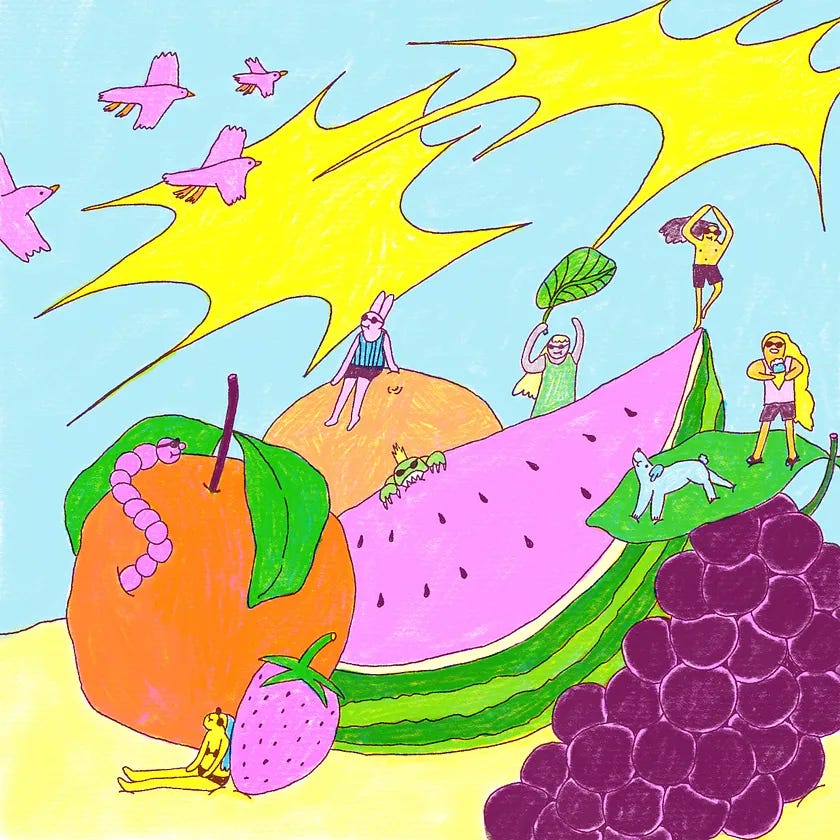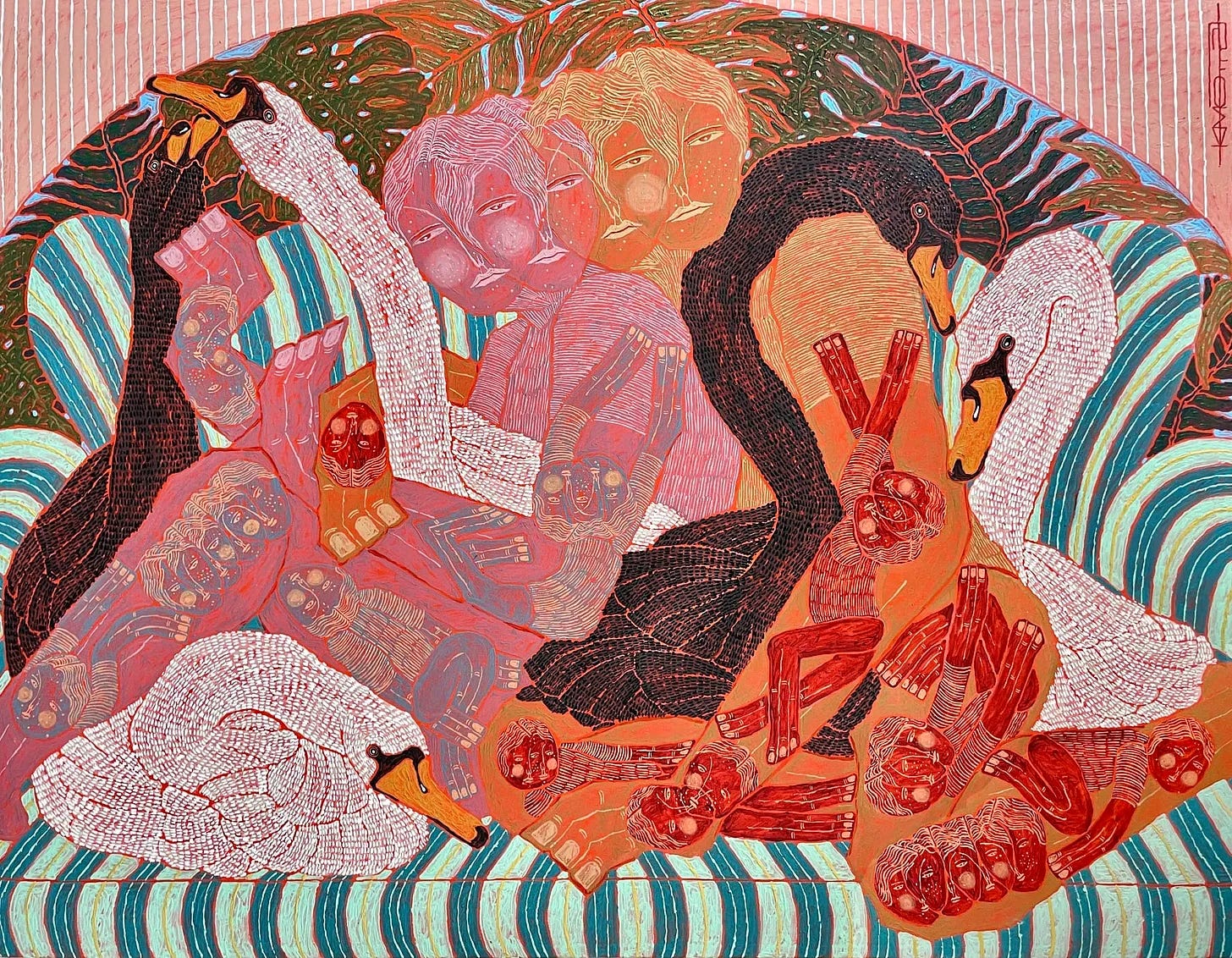“We dream of flip phones”
In this edition of the Weekender: contemplating fruit, phones, and the impractical dream of a pristine white shirt

Depending on your hemisphere, it’s either the longest day of the year or the shortest. This week’s selections echo that contrast: fresh fruit suggests death, technological advances trigger breakdowns, and a poem views the phone as both anchor and portal.
TECHNOLOGY
The ghost in the machine
Reflecting on a spate of stories about ChatGPT-triggered psychotic breaks, Katherine Dee reviews the long-entwined history of technological breakthroughs and mental breakdowns.
Let's Talk About ChatGPT-Induced Spiritual Psychosis
—
inTwenty-five years ago, media scholar Jeffrey Sconce traced this history in his book Haunted Media, showing how we have consistently linked new communication technologies with the paranormal and esoteric. It’s not a random coincidence or sign that we’re in a “uniquely enchanted” age but rather a predictable cultural response, one we’ve been replaying over and over for hundreds of years.
Spiritualist mediums claimed to receive messages from the afterlife through Morse code. These operators saw themselves as human receivers, bridging the material and astral. The technology that sent messages across continents without physical contact made it easy to imagine messages crossing the veil.
Radio seemed to throw every word into what Sconce calls an “etheric ocean,” a limitless and invisible sea where messages bobbed about like bottles adrift. By the late 1920s, the big broadcast companies tried to “net” that ocean with fixed frequencies and scheduling. Sconce writes about how fiction reflected this taming of the radio waves. The wistful romances of amateur “DXers” scanning the dial gave way to sinister tales of mass hypnosis, government mind-control rays, and Martians commandeering the airwaves.
Television, again, added another layer, perhaps most iconically portrayed in the 1982 film Poltergeist.
Radio had offered only disembodied voices, but TV projected bodies—figures that looked solid but weren’t. That were almost there but not quite. Like a ghost. Media cemented the idea that our television sets were more than an appliance: they, too, could cross beyond the veil.
Now re-watch another iconic “magical TV” scene—this time from The Ring (2002)—with that history in mind [above].
Sconce identified three recurring fantasies that emerge with each new medium: the dream of consciousness escaping the body to travel through broadcast; the belief in autonomous “otherworlds” created by the technology itself; and the tendency to see machines as somehow alive or haunted.
Every technology that promises to transcend physical limits invites us to imagine what else might slip through the gaps we’ve opened. The ghosts in the telegraph weren’t about—or just about—death anxiety; they were about the radically isolated individual suddenly able to communicate across vast distances, needing to believe that communication could transcend even mortality. The voices in the radio static weren’t just paranormal fantasies; they were the sounds of mass society seeking individual meaning in mass media. The possession through television wasn’t just fear of technology; it was the atomized viewer trying to understand their relationship to the strangers in their living room.
PHOTOGRAPHY

SHORT STORY
Fuzzy memory
Fruit, faces, and memory coalesce into a gently disquieting memento mori in Maxine Barton’s short story.
Big softy
—
inI spent the last week solidifying the mental image for “nectarine” and “tangerine” in my mind. This may seem simple, but nouns can be slippery for me. I have it, though. I can differentiate those two almost instantly at this point. One, maybe two seconds of thought and I’m there.
I always put various stone fruits into the same produce bag. Today, next to the nectarines are apricots. I recognize the name from dried fruit I’ve yanked off between my teeth in the past. I love how tiny dried fruit becomes. Makes me wonder what would happen to a corpse left out in the sun.
Apricots, I say to myself as I reach for a few of them. They are so supple—the fur is much softer than a peach’s fuzz.
I make my way to the vegetables, then the fish counter, and then to the non-perishables.
As I put my items on the conveyor to check out, I tell the clerk that there are nectarines, plums, and. . . I don’t remember what they’re called. . . in that bag.
“Apricots,” he says.
“Ah. Yes, apricots. It’s hard for me to keep all those straight in my head.”
“I just remember them as the super soft ones.”
I look at his face. His face is super soft. Most of his skin is the same fleshy tan as the apricot; his cheeks the same pink as the fruit’s undertones. He is full of water and alive.
I wonder how the tactile feeling of something helps him remember its name.
“That’s good. That’ll help it stick,” I say.
What will actually make it stick is his tender apricot face, surrounded by a blur of fine, frizzy hair; the way he told me to be safe as he handed me my receipt.
PAINTING

POETRY
Phone poem
Quirine Brouwer captures the familiar ambivalence of life on a screen: the urge to quit, the pull to stay, and the uneasy tension of phones as both tether and window.
All my friends and I talk about is getting rid of our phones
—
inall my friends and I talk about is getting rid of our phones— a dystopian dream dominating dinner conversation, our phones on the middle of the table like candles like altars like tiny gods we are trying not to worship we talk about quitting like smokers do— “next week” “after this trip” “when I found the love of my life on a dating app” we make promises to each other the way people talk about leaving a bad relationship while still keeping their toothbrush ready by the sink we dream of flip phones— clamshells of another life decorated with glitter and stones and dangly little charms the pixels soft enough to forgive our youthful acne and ringtones we bought by texting MTV the only calls we received were from our mother, telling us to come home, dinner was on the table there was no algorithm to drill us into compliance no one to tell us: you are behind you are cutting your onions wrong you need to buy this thing (and this one and this one) you are a rat girl joan didion girl soft girl clean girl iphone face never enough girl we say: let’s go camping just us and a map and maybe a knife just in case (but what if we lose our way what if someone dies what if I see something beautiful?)
NOTED

STYLE
FASHION
The white tee, under siege
A chronicle of a familiar losing battle: the attempt to keep a white shirt clean.
White tee shirt rules
—
inRule 1: Rock your tee after applying makeup.
Popped my new white tee shirt on this week and the collar was immediately the colour of my skin, my jutting chin having transferred the foundation as it passed o’er my face.
If you’re a long-faced girlie like me (with a massive head), simply do your makeup once the tee is in place. Heart-shaped ladies will have no trouble, nor will tiny head huns, little-faced babes and, of course, my neckhole queens (women with faces the exact shape and size of a tee shirt neckhole). I used to write for Grazia.
Rule 2: Do not eat standing up.
One wash later, I wore the white tee while boiling ramen and decided to partake in my customary forkful of kimchi out of the jar. It’s one of my joys, it’s one of my desires, no judgement, no shame. Unfortunately it led to me plopping dyed cabbage down myself, which consequently introduced both judgement and shame to my joys and my desires. It was like the bit in the Bible when they realise they’re naked.
The shame is justified because this shouldn’t have been a rule I needed to learn beyond age three, but there’s something fun about eating stuff whenever and however you want, as an adult. Dessert before dinner. Packet of cherry tomatoes as a snack while walking around town. Kimchi out of the jar is careless, though, and I’ve definitely taken this too far in other ways, too. For example, I bought a packet of beetroot to eat on the train last week and stained my fingers, hands, arms and face for the remainder of the afternoon. Say it with me: pickled foods aren’t finger foods—except gherkins, please allow us gherkins out of the jar, amen.
‘We don’t need to say that with you, it’s really obvious’ shut up.
Rule 3: Do not eat ramen while rocking the tee.
Yeah I kept the tee on because everything was fucked anyway, so ended up pebbledashing the front of the tee with broth until it looked like my nanna’s house, except rather than little stones it was little spots of Clearspring and rather than a house it was my torso.
Rule 4: Don’t be tired when rocking the tee.
With a greater grasp of the food rules, and having washed the tee shirt a second time in 24 hours (this time with lots of Vanish—if anyone knows a stain remover that is environmentally friendly/doesn’t march into the sea and start strangling the cod with its bare hands, please tell me), I ate lunch before I put the tee shirt on and went to a job which involved me being in a clean studio.
I refused all snacks in case of stains, and also because I wanted to wait till I was at home due to buying this really good sourdough bread, you know the stuff that doesn’t make your mouth bleed? And isn’t mainly air? Really dense, soft, bouncy pillows. Anyway I got in, took the tee shirt off, and there was a weird mark on the back. Because I had leant on a wall at the station. Because I was tired. Probably because of all the fucking stress this white tee shirt is causing me.
DRAWING

FOOD
What we’re watching this week
Tuesday, June 24, at 5 p.m. ET
of Are You Okay? will go live with to discuss myths and facts about menopause, HRT, and women’s health.Substackers featured in this edition
Art & Photography:
, , , ,Video & Audio:
,Writing:
, , ,Recently launched
Inspired by the writers and creators featured in the Weekender? Starting your own Substack is just a few clicks away:
The Weekender is a weekly roundup of writing, ideas, art, audio, and video from the world of Substack. Posts are recommended by staff and readers, and curated and edited by Alex Posey out of Substack’s headquarters in San Francisco.
Got a Substack post to recommend? Tell us about it in the comments.























Ever since I gave up my cell phone for email, and a landline, my life has improved.
Each year my wife and I take multiple digital detoxes - which helps keep us sane:
https://romanshapoval.substack.com/p/digitaldetox2
The aether is real — unsure if ChatGPT or other technologies can influence it, but it’s definitely real. Did a whole series on it: https://unorthodoxy.substack.com/p/why-would-they-hide-the-aether-part
As part as smartphones, definitely agree as well. Just a few decades ago, like 85% of communication was in person — now 75% of communication is through technology. Oh what a switch: https://unorthodoxy.substack.com/p/the-great-connector-how-cellphones